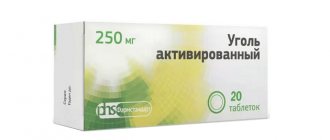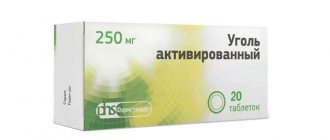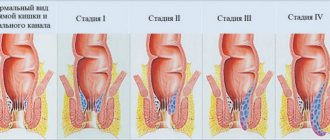Nausea is not a separate disease, but only a subjective, unpleasant symptom that indicates problems in the body. And it does not always occur only with digestive problems. Nausea often precedes an attack of vomiting and can occur against the background of abdominal pain and diarrhea, as well as headaches, high blood pressure and head trauma. To choose remedies that will effectively eliminate nausea, it is necessary to determine the cause of its development, which only a doctor can do. Therefore, if nausea occurs frequently and is accompanied by other symptoms, you need to make an appointment with a specialist and undergo an examination, after which he will select safe and effective anti-nausea pills for adults. You cannot do this on your own; the drugs are quite strong and may have side effects.
To suppress nausea, drugs of several groups are usually used, which affect the center of nausea and vomiting in the brain through different mechanisms. The choice of the best anti-nausea pills for adults is made by a doctor, taking into account specific symptoms, possible causes and additional complaints, age and existing concomitant diseases.
What are anti-nausea pills?
In general, 4 groups of drugs are used to suppress nausea:
Serotonin receptor antagonists . Drugs in this category do not suppress the synthesis of serotonin, a hormonal compound that transmits various impulses from internal organs to the brain, which causes nausea and vomiting. However, they help in eliminating its effects on the vomiting center and the formation of the reflex. As a result, the process of suppressing nausea and vomiting occurs as naturally as possible, without sharp fluctuations in the level of serotonin in the plasma and brain. The drugs are quite effective in suppressing nausea of various origins.
Histamine receptor blockers . These drugs are used to suppress allergic reactions, but they can also inhibit the processes in the brain that form the arc of the gag reflex. Only first generation antihistamines that significantly affect the functioning of the nervous system are considered suitable.
Anticholinergic agents . These are medications that not only can suppress the development of the gag reflex due to the fact that they block interaction with certain receptors. At the same time, they eliminate spasms of smooth muscle fibers in the digestive tube. The additional sedative effect of the drugs helps prevent new vomiting and attacks of nausea.
Dopamine antagonists . Dopamine is a neurotransmitter, a substance that transmits signals to nerve cells, and when it influences trigger zones in the vomiting center, it can provoke attacks of nausea. Accordingly, substances antagonistic to dopamine can block receptors that enhance its synthesis. As a result, the gag reflex is suppressed.
Separately, we can distinguish a group of drugs that have a mild antiemetic effect and eliminate nausea due to natural ingredients. Their effect is not as pronounced, but there are also much fewer side effects. Usually these are plant extracts and combination products.
It is worth taking a closer look at the new generations of drugs against nausea and vomiting. They have more pronounced effects than other drugs, eliminating nausea without serious effects in the central nervous system. Thus, they do not have pronounced sedative and hypnotic effects, and they can be used at any time of the day. However, they also have a number of serious disadvantages, since they have a number of serious complications if the dose is exceeded or the rules for their use are violated. They can affect vision and liver function, so the selection of medications should only be done by a doctor.
What to eat after poisoning and vomiting?
Every person thinks about what to eat after poisoning and vomiting, because all the body’s forces will be aimed at its own recovery. A well-designed nutrition plan can help him with this.
The diet should be very gentle. On the day the poisoning occurred, you need to limit food intake to a minimum. Most often, sweet tea and crackers are enough. If the condition returns to normal in the evening, you can prepare low-fat, salted chicken broth. You can cook liquid dairy-free porridge: semolina, rice or buckwheat. Doctors also allow a small amount of mashed potatoes without butter and milk.
The next day after poisoning, you can diversify your menu somewhat, but only if there is no deterioration in your condition. A little boiled chicken meat or steamed poultry cutlets are allowed. The emphasis should be on lean dishes that will not burden the digestive tract and will be absorbed by the body as fully as possible. It is good to replace the soup with rice water on the second day.
In the first days after poisoning, the following foods and drinks are absolutely prohibited:
- Kissel, juice, coffee, sparkling water.
- Chocolate.
- Fatty and fried foods.
- Salty, spicy and canned foods.
- Raw vegetables.
- Fruits: plums, grapes, pears. As for citrus fruits, they can be consumed no earlier than 3 days after poisoning.
- Alcoholic drinks.
- Dairy and fermented milk products.
Apples are allowed as fruit, but they should be baked in the first two days.
It is important to remember not only what you can eat, but also how it should be done. Meals should be frequent (up to 6 times a day), but the portions themselves should be small. You should not switch to your usual diet before 5-6 days. Most often, the person himself understands that the body has recovered and is ready for the previous nutritional loads.
However, in the first 14 days, it is still highly advisable to give preference to cereal dishes (soups and cereals); you can cook borscht with sauerkraut, but without frying. It is possible to carefully include pea puree in the menu (no earlier than 6-7 days after mild food poisoning), which is an excellent source of amino acids. But you need to eat it in very small portions and provided that the body has not previously given undesirable reactions to this dish. It is also advisable to limit the consumption of meat, especially fatty varieties, for up to 14 days. It is better to replace it with chicken meat and lean fish.
Top 10 rating according to KP
We have selected the most effective and frequently prescribed medications for nausea in adults, which are sold in pharmacies. It is important to know that any medicine must be prescribed by a doctor, and the list below is not a guide to action. Before purchasing a medicine, you need to consult a specialist, and for many drugs you need a doctor’s prescription.
Cerucal
Cerucal.
Photo: Merckle GmbH The drug is available in the form of tablets and solutions for intramuscular injection, the active ingredient is metoclopramide, available with a doctor's prescription. The medicine has been used for many years in various fields of medicine to eliminate nausea and vomiting in adult patients.
The drug suppresses the activity of dopamine and serotonin receptors, thus reducing the activity of the vomiting center in the brain. It also suppresses pathological impulses coming from the stomach to the center of nausea and vomiting. Additionally, it tones the muscles of the stomach and intestines, accelerating the movement of contents and emptying of the stomach, and normalizes the tone of the bile ducts.
Indicated as a symptomatic drug:
- with nausea and vomiting of any origin (against the background of infectious pathology of the digestive tract, with traumatic brain injuries, with migraines, after chemotherapy and operations);
- helps with hiccups, impaired motility of the digestive tract;
- used for nausea due to gastritis, colitis, reflux esophagitis.
The drug does not help in case of nausea caused by motion sickness and in case of overdose of drugs from the group of antipsychotics. A side effect may include disorders in the extrapyramidal system with the appearance of hand tremors, impaired motor activity and other signs of parkinsonism.
It is prohibited if you are allergic to components, during pregnancy and breastfeeding, if you have a stomach or small intestine ulcer, if there is a violation of the muscle tone of the digestive tube (dyskinesia) and if perforation of the stomach or intestines is suspected.
The medicine is incompatible with alcohol and is prohibited when driving or engaging in activities that require concentration.
Good to know
Food poisoning in an adult: symptoms, first aid, prevention
Motilium
Motilium.
Photo: anssen-Cilag SpA The drug is sold in tablets, including for resorption in the oral cavity. Available without a prescription, the active ingredient is domperidone. This drug from the group of dopamine receptor antagonists has an antiemetic effect due to the blockade of receptors in the region of the vomiting center of the brain and inhibition of the transmission of impulse flow from the stomach and intestines. In addition, the drug stimulates intestinal motility, accelerating the removal of contents from the stomach into the intestine.
Shown:
- for nausea of any origin, especially against the background of functional digestive disorders, reflux esophagitis and gastric atony;
- with vomiting, belching, flatulence due to digestive problems.
It has no side effects in the form of extrapyramidal disorders. Prohibited if internal bleeding or perforation of the stomach walls is suspected. Contraindicated in case of severe heart problems and liver damage.
Dramamine
Dramamine.
Photo: Jadran The drug is available in tablets without a doctor’s prescription and is based on the active ingredient – dimenhydrinate. Belongs to the group of antihistamines, has anticholinergic properties with antiemetic effects, suppresses nausea and vomiting, especially during motion sickness in any type of transport. Take one tablet three times a day before the start of the trip. Course treatment is not acceptable; it should be used only when symptoms appear.
Shown:
- with increased excitability of the vestibular apparatus (sickness, Meniere's disease);
- to eliminate dizziness due to motion sickness.
The drug is prohibited during pregnancy, breastfeeding, and is incompatible with alcohol. Do not take while driving a car, as it causes drowsiness and severe lethargy.
On a note
Top 10 clinics where you can do gastroscopy in Moscow
Latran
Latran.
Photo: Pharmzaschita The drug is available in tablets and injection solutions and is sold with a doctor’s prescription. The active ingredient, ondansetron, belongs to the group of serotonin receptor blockers. It has an effect by suppressing the activity of serotonin receptors in the region of the vomiting center of the brain, plus it has a depressing effect on the vagus nerve, which supplies impulses to the brain.
Shown:
- for nausea and vomiting after chemotherapy or radiation treatment.
It is well tolerated, can provoke dizziness and headaches, but does not affect dopamine receptors and does not provoke extrapyramidal disorders. Prohibited during pregnancy and lactation, or if you are allergic to the components.
Buscopan
Buskopan.
Photo: Delpharm Reims The drug is available in tablets and rectal suppositories and is available without a doctor’s prescription. The active ingredient is hyoscine butyl bromide, belongs to the group of cholinergic blockers. Inhibits secretion by the glands of the digestive tract, has an antispasmodic effect on the muscles of the digestive tube.
Shown:
- with pylorospasm, abdominal colic, biliary colic with nausea and vomiting;
- exacerbation of intestinal or stomach ulcers with nausea;
- biliary dyskinesia with a tendency to spasms.
Allowed during pregnancy (from the second trimester) and while breastfeeding. It is prohibited for use in patients with megacolon (dilation of the intestine) and with glaucoma, myasthenic syndrome, arrhythmias with tachycardia.
show more
Aminazine
Aminazine.
Photo: Valenta Pharm Antipsychotic drug based on chlorpromazine. The antiemetic effect enhances the sedative properties of the drug. Aminazine is indicated for use in cases of vomiting during pregnancy and as a drug for vomiting that occurs while taking antitumor drugs and radiation therapy.
Aminazine is not used for pathologies of liver and kidney function, for systemic diseases and brain injuries. During pregnancy, the dosage is selected by the doctor. Breastfeeding should be discontinued during treatment of nausea and vomiting with Aminazine. Prescription drug.
Air-sea
Air-sea.
Photo: Materia Medica The drug is designed to eliminate the symptoms of motion sickness, when vomiting and dizziness appear in adults and children over 6 years of age. Effective against seasickness.
These lozenges can be used during pregnancy and lactation after consultation with a doctor. You can take up to 5 tablets per day. The remedy is homeopathic, no prescription required.
show more
Bonin
Bonin.
Photo: Pfizer, Inc A drug for the relief of vomiting and nausea containing meclozine. Available in the form of oral tablets and chewable tablets.
Indications for use:
- nausea;
- vomit;
- dizziness.
It is possible to use the drug to relieve side effects that occur during radiation therapy. Bonin is allowed for children over 12 years of age if the dosage is observed.
The drug causes drowsiness, and therefore you should avoid driving a car for the period of use.
Good to know
An adult gets sick in the car: what to do and why it happens
Hofitol
Hofitol.
Photo: Rosa-Phytopharma The drug contains natural extract of artichoke leaves. The drug is a choleretic agent and can be prescribed for toxicosis during pregnancy.
Available in tablet form. The main indications include: chronic nephritis, hepatitis, liver cirrhosis, renal failure. Contraindicated for children under 6 years of age.
If you have cholelithiasis, Hofitol should not be taken. Diarrhea may develop with prolonged use.
show more
Pancreatin
Pancreatin.
Photo: avexima Pancreatin in tablet form promotes better digestion of food if nausea is felt after eating. The component of the same name in the composition is effective for disorders of food absorption after surgical interventions and poor nutrition.
The drug is allowed for children over 3 years of age, but the dosage is determined by the doctor. You can purchase the medicine without a prescription. In the acute period and in the exacerbation phase of chronic pancreatitis, Pancreatin is not used.
show more
What to do in case of poisoning?
Mild poisoning, which most often occurs in most people, is not considered a serious illness. As a rule, even without any specialized treatment, they disappear after 1-3 days.
The basic rules of behavior in case of food poisoning are as follows:
- Removing intoxication, ridding the body of toxins.
- Prevention of dehydration.
- Restoring normal bowel function.
- Following a special diet.
First aid for a patient with food poisoning is to combat the toxic substance that has entered the body.
To do this you need to follow these steps:
- Gastric lavage.
Vomiting alone is not enough to cleanse the organ of toxic substances. Therefore, after the first attack of vomiting, gastric lavage is necessary. To do this, prepare a special solution (3 liters of boiled water is mixed with potassium permanganate to obtain a pale pink liquid), which is drunk in a volume of 500 ml. After this, vomiting is provoked by pressing the fingers on the root of the tongue. You need to rinse your stomach until clean water starts coming out of it. Potassium permanganate can be replaced with powdered activated carbon or salt.
- Prevention of dehydration.
Since vomiting during poisoning is often accompanied by repeated diarrhea, the person loses large volumes of fluid. It is worth remembering that dehydration is very dangerous for both adults and children. Therefore, after each attack of vomiting you need to drink at least 200 ml of plain water. In order not to provoke another attack of vomiting, you need to drink water in small sips, but as often as possible. What else you can drink if you are poisoned and vomiting will be discussed below.
- Restoration of intestinal function.
The most common and most dangerous illiterate action that most people take when poisoned is stopping diarrhea with the help of medications. You should always remember that diarrhea in case of poisoning is a protective reaction of the body aimed at the rapid elimination of toxic substances. If pathogenic feces are retained in the body, this will lead to them beginning to be absorbed through the intestines into the blood. As a result, the symptoms of intoxication will only get worse. Therefore, you need to wait until the diarrhea stops on its own. Probiotics and eubiotics help restore normal intestinal biocenosis. These are drugs such as Bifidumbacterin, Linex, Bionorm, Baktisubtil, etc. They are recommended for use during the recovery period after poisoning.
- Carrying out sorption therapy.
In order to help the body remove toxic substances faster, it is possible to take enterosorbents. They should begin to be used when the patient has stopped vomiting. Sorption therapy is not carried out at high body temperatures; it is recommended with caution for elderly people and children under one year of age. Sorbent preparations are: Smecta, Activated carbon, Polysorb, Enterosgel, Polyphepan, Filtrum STI, etc.
- Dieting.
You should not abstain from eating for too long; if the vomiting and diarrhea were not severe and quickly self-destructed, then after a couple of hours the patient can eat a cracker and drink warm sweet tea. In the future, he is advised to follow a gentle diet, which will restore intestinal function.
How to choose anti-nausea pills for adults
The first thing that is important when choosing drugs is the cause of nausea. These could be poisoning, digestive problems, infectious diseases. In addition, nausea can be a side effect of drugs (for example, when taking chemotherapy) or a consequence of a drug overdose. For each situation, it is necessary to select drugs with a specific mechanism of action:
- If these are viral pathologies of the digestive system, poisoning and microbial pathologies, dopamine receptor blockers may be indicated.
- If it is nausea due to chemotherapy, drugs that have an antagonistic effect on serotonin receptors will be more effective.
- During pregnancy, it is worth fighting nausea using natural herbal ingredients and non-drug remedies.
- For nausea that occurs as a result of motion sickness in various types of transport, including sea transport, antihistamines are indicated.
- Against the background of autonomic reactions and problems with the nervous system, medication intake largely depends on the presence of concomitant conditions and the main diagnosis.
Important ! Anti-nausea medications do not treat the underlying problem, they only suppress the unpleasant symptom, and are usually combined with treatment of the immediate causes of the nausea attack. Without eliminating the cause itself, nausea will occur again and again, and only antiemetics will be ineffective.
Character of vomiting in case of poisoning
Vomiting is the very first symptom, which indicates that toxic substances have entered the stomach. Poisoning develops acutely, the latent stage most often does not exceed 6 hours. Sometimes it can be shortened to half an hour or stretched to a day, but this happens extremely rarely.
Initially, the patient experiences an acute attack of nausea, which soon ends with vomiting. It is repeated again and again, the vomit contains the food eaten. Depending on the severity of poisoning, vomit may contain blood, which is a serious symptom and requires immediate medical attention.
It should be noted that vomiting, which occurs as a sign of poisoning, should bring relief to the patient.
Other symptoms of poisoning are:
- Diarrhea;
- Stomach ache;
- Increased body temperature;
- Headache and muscle pain, as well as other signs of intoxication of the body.
Popular questions and answers
We asked questions regarding the development of nausea and its elimination to gastroenterologist, therapist Vera Samsonova.
Why might nausea occur?
Nausea can be caused by various reasons.
Here are the main ones: - Heartburn or reflux of stomach contents into the lumen of the esophagus creates a burning sensation that causes nausea. — By multiplying in foods and releasing toxins, food bacteria cause poisoning. Viral infections also cause nausea.
— Taking medications, such as chemotherapy for cancer treatment, may cause stomach upset or nausea. Be sure to read the information about the drug that was prescribed to you and discuss the nuances of taking it with your doctor.
— Seasickness and motion sickness occur because while traveling in a car, train or ship, messages sent to the brain are not synchronized with our sensations of movement. This provokes nausea, dizziness or vomiting.
— Overeating or eating certain foods, such as spicy or fatty foods, can upset your stomach and cause nausea. Foods to which you are allergic can also cause nausea.
- Severe pain contributes to the appearance of symptoms of nausea - this is especially true for pancreatitis, gallstones or kidney stones.
- Ulcers of the stomach or small intestinal mucosa contribute to nausea.
Nausea is also a symptom of a number of other diseases, including: benign paroxysmal positional vertigo; ear infections; acute cardiovascular disease; intestinal obstruction; liver failure or liver cancer; meningitis; migraine.
What to do if you feel sick?
Treatment for nausea depends on the underlying cause.
In most cases, nausea goes away on its own, especially if you vomit. Treatment may include drinking plenty of fluids and switching to a liquid diet. Severe nausea may require treatment with medication. If you're feeling nauseous, you might want to focus on food or drink, although sometimes light, simple foods like bread and crackers can help you feel better. Avoid any foods that have a strong flavor, are very sweet, fatty or fried. They may increase nausea or even cause vomiting. Natural remedies for nausea include ginger, ginger and peppermint teas, as well as mild foods that can help soothe the stomach. Some people find relief from nausea by applying gentle pressure to the inside of the wrist with their thumbs.










